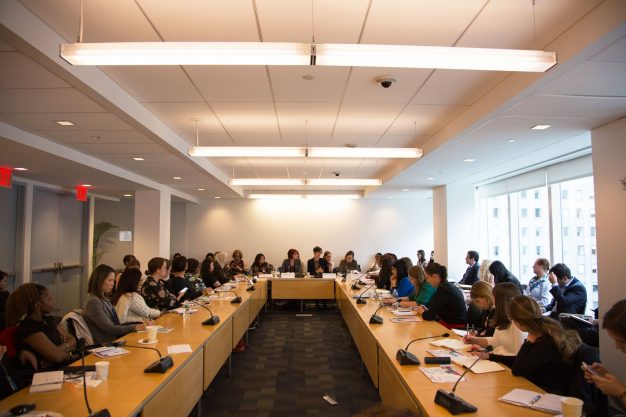Download the Press Release in PDF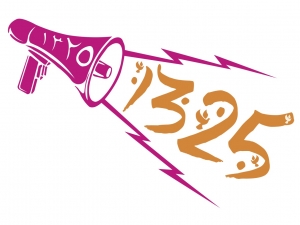 NEW YORK, USA – Women peace activists are at the heart of the recent events in the Middle East and North Africa (MENA); using innovative strategies for implementing a Women, Peace & Security agenda while facing multiple challenges of a rapidly changing society. During the panel discussion “Amplifying the Voices of Women in the MENA Region”, women peace activists from the MENA region expanded on the challenges and opportunities of implementing UN Security Council Resolution (UNSCR) 1325. The panel discussion was organized for the occasion of the 14th anniversary of UNSCR 1325 by the Women Peacemakers Program (WPP), the Women Empowerment Organization, ABAAD - Resource Center for Gender Equality, Women's International League for Peace & Freedom (WILPF), and the Post 2015 Women's Coalition. It took place on October 30, at the Permanent Mission of the Kingdom of the Netherlands to the United Nations in New York.
NEW YORK, USA – Women peace activists are at the heart of the recent events in the Middle East and North Africa (MENA); using innovative strategies for implementing a Women, Peace & Security agenda while facing multiple challenges of a rapidly changing society. During the panel discussion “Amplifying the Voices of Women in the MENA Region”, women peace activists from the MENA region expanded on the challenges and opportunities of implementing UN Security Council Resolution (UNSCR) 1325. The panel discussion was organized for the occasion of the 14th anniversary of UNSCR 1325 by the Women Peacemakers Program (WPP), the Women Empowerment Organization, ABAAD - Resource Center for Gender Equality, Women's International League for Peace & Freedom (WILPF), and the Post 2015 Women's Coalition. It took place on October 30, at the Permanent Mission of the Kingdom of the Netherlands to the United Nations in New York.
Fourteen years into the implementation of UNSCR 1325, the recent events in the MENA region provide the opportunity to assess the capability of the Resolution to make a difference in the lives of women peace activists. For this assessment, it is crucial to listen to women activists from the region and learn from their strategies for creating opportunities and overcoming obstacles for implementing the Women, Peace & Security agenda. The results of the implementation of UNSCR 1325 within this context provide important input for international UN policies and processes, such as Post 2015 Development agenda and the Global Study on UNSCR 1325.
Karel van Oosterom, Permanent Representative of the Netherlands to the UN in New York, opened the panel discussion. In his speech he stressed the importance of highlighting women’s role as actors and change agents, not just as victim, and he stated “Without the inclusion of women in all aspects of life, whether political or in the economy, there can be no sustainable peace and no sustainable development”.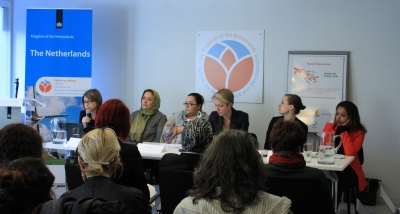 In their contributions, Suzan Aref, Director of the Women Empowerment Organization and Rida Al-Tubuly, Executive Manager of the 1325 Network in Libya, reflected on the armed conflicts taking place in Iraq and Libya in relation to their effects on the Women, Peace & Security agenda. The adoption of the National Action Plan (NAP) in Iraq is a step forward; its added value is immediately tested by the armed conflict in the country. In Libya, the increased militarization is specifically affecting women, directly threatening the personal safety of prominent women peace activists. 14 years after the adoption of UNSCR1325, there is little recognition of the resolution in Libya, negatively affecting the attempts to develop a NAP. Both Suzan Aref and Rida Al-Tubuly stated that in conflict and post-conflict situations, women are mainly framed in the context of victimhood; their role as agents of change through peace building and reconciliation is often disregarded.
In their contributions, Suzan Aref, Director of the Women Empowerment Organization and Rida Al-Tubuly, Executive Manager of the 1325 Network in Libya, reflected on the armed conflicts taking place in Iraq and Libya in relation to their effects on the Women, Peace & Security agenda. The adoption of the National Action Plan (NAP) in Iraq is a step forward; its added value is immediately tested by the armed conflict in the country. In Libya, the increased militarization is specifically affecting women, directly threatening the personal safety of prominent women peace activists. 14 years after the adoption of UNSCR1325, there is little recognition of the resolution in Libya, negatively affecting the attempts to develop a NAP. Both Suzan Aref and Rida Al-Tubuly stated that in conflict and post-conflict situations, women are mainly framed in the context of victimhood; their role as agents of change through peace building and reconciliation is often disregarded.
“A National Action Plan is an important tool for women's organizations to pressure and demand women’s participation in peace processes, especially in relation to the current armed conflict and challenges our country is facing.” Suzan Aref, Director of Women Empowerment Organization, Iraq.
Looking at UNSCR 1325 from a regional perspective, Ghida Anani, Director of ABAAD-Resource Center for Gender Equality, stressed the need to go beyond the traditional implementation of UNSCR 1325. For effective implementation in the MENA region, it is important to look at structural violence in societies and to incorporate a masculinities perspective for the inclusion of men in the implementation.
Isabelle Geuskens, Execuritve Director of the Women Peacemakers Program, noted that the experiences from the MENA region echo remaining obstacles of UNSCR 1325 implementation globally. Issues affecting the MENA region, such low participation of women in peace-processes, shrinking space for civil society, with specific effects on women’s organizations, and the marginalization of armed conflict prevention mechanisms have to be addressed at a global scale and included in the Global Review on UNSCR 1325. Selamawit Tesfaye, Coordinator of the Post 2015 Women’s Coalition, highlighted that development cannot happen without peace. Amplifying the voices of women in the MENA region is important for the overall integration of the peace and security agenda into the Post 2015 development agenda.
“Although we are glad with the achievements in terms of UNSCR 1325 implementation along the years, there is still a long way to go. The dynamics in the MENA region illustrate the much needed attention for armed conflict prevention, nonviolence and disarmament, which remains marginalized within the current UNSCR 1325 framework.” Isabelle Geuskens, Executive Director WPP, The Netherlands
The event concluded with an open debate about the implementation of UNSCR 1325 in the MENA region, including recommendations for the international community.
[END]
For more information, contact Sophie Schellens at sophie@womenpeacemakersprogram.org
Women Peacemakers Program (WPP)
The Women Peacemakers Program has been established in 1997 to support and empower women peace activists. WPP actively advocates for the recognition of women’s experiences and peacebuilding contributions during war and conflict and the integration of a gender perspective in peacebuilding processes. The Women Peacemakers Program ’s vision is of a world where women and men work together as allies to build communities where people co-exist peacefully through active nonviolence. Its mission is to support the empowerment of gender-sensitive women and men for the transformation of conflict through active nonviolence.
www.womenpeacemakersprogram.org
Women Empowerment Organization
Women Empowerment Organization (WEO) is a non-governmental, voluntary and independent organization, established in June, 2004 which works in Erbil, Iraq to consolidate women's role and ability in the Iraqi community through enhancing their social, political, economic and cultural participation. WEO holds trainings, seminars, conferences and workshops that foster an exchange of information and experience among national, regional and international human rights movements. Women’s and human rights, gender equity, economic engagement and political participation are promoted, as well as elimination of all forms of discrimination against women. WEO also encourages youth and women participation in the development and rebuilding process of Iraq especially in the economic terms and supporting them to locate employment opportunities.
www.weoiraq.org
ABAAD - Resource Center for Gender Equality
ABAAD - Resource Center for Gender Equality is a non-profit, non-politically affiliated, non-religious civil association founded in June 2011 with the aim of promoting sustainable social and economic development in the MENA region through equality, protection and empowerment of marginalized groups, especially women.
www.abaadmena.org
Women’s International League for Peace and Freedom (WILPF)
WILPF started as a movement in 1915 when 1,200 women from a diversity of cultures and languages came together in The Hague during the First World War, to study, make known and eliminate the causes of war. WILPF’s mission is to end and prevent war, ensure that women are represented at all levels in the peace-building process, defend the human rights of women, and promote social, economic and political justice.
www.wilpfinternational.org
Post 2015 Women's Coalition
The Post 2015 Women’s Coalition is an international network of feminist, women’s rights, grassroots, peace and social justice organizations, networks and individuals. The Coalition is focused on feminist movement building from the ground up, beyond the Post 2015 processes to address the urgent need for strengthened feminist movement for sustained, nuanced, participatory and inclusive feminist engagement at multiple levels across issue areas.
www.post2015women.com
12 Dec '17 Today, we are pleased to share with you the Conference Report “Financial Inclusion for Freedom and Security” by the Women Peacemakers Program, Duke Law International Human Rights Clinic, Human Security Collective, Transnational Institute, the Charity & Security Network, in cooperation with the Knowledge Platform Security and Rule of Law.
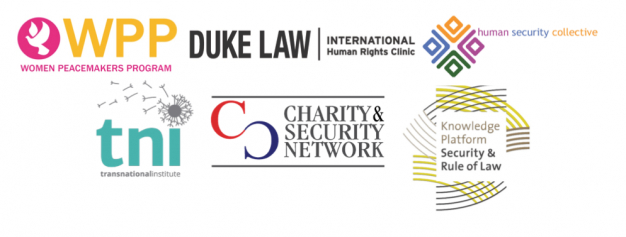
7 Dec '17 Today, on the 13th day of the 16 Days of Activism Against Gender Violence Campaign, we bring you the sad news that from 15 December onwards, the Women Peacemakers Program (WPP) will have to close its doors. We would like to ask for your time to read what has driven us to make this decision.
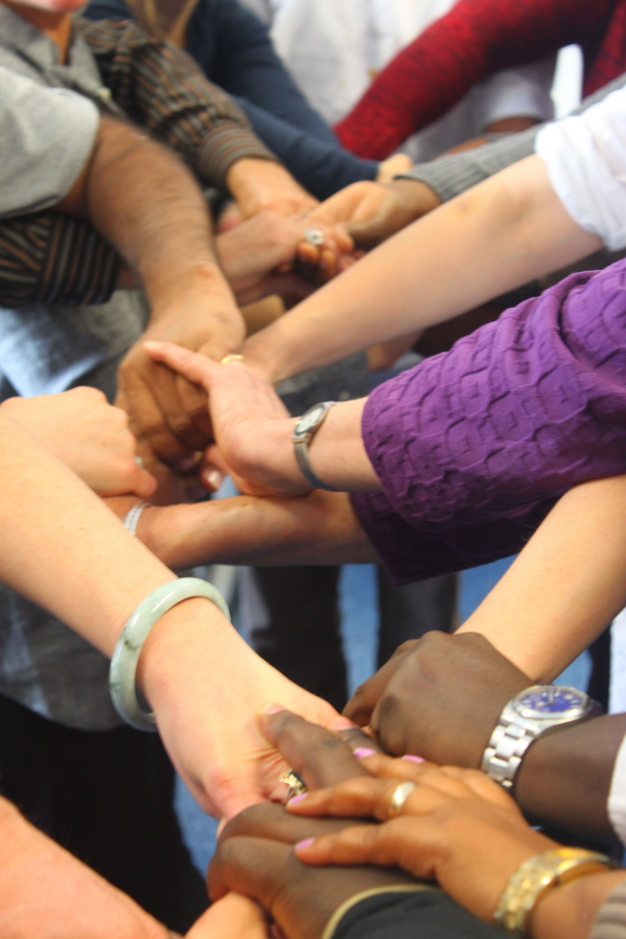
7 Nov '17 On Thursday, 26 October 2017, a side event entitled, “Pulling the Rug from Under Our Feet: What is the UNSCR 1325 Without Civil Society Freedoms?” was hosted on the margins of the 17th anniversary of United Nations Security Council Resolution (UNSCR) 1325. The event was hosted by the Women Peacemakers Program (WPP) and the Dutch Mission, in collaboration with Duke Law’s International Human Rights Clinic, Al-Hayat Center for Civil Society Development, Arab Women Organisation of Jordan, NOVACT, Free Sight Association, Iraqi Al-Amal Association, Women Empowerment Organisation, NGO Working Group on Women, Peace and Security and Women’s International League for Peace and Freedom. This article briefly looks at the main issues discussed during the event.
